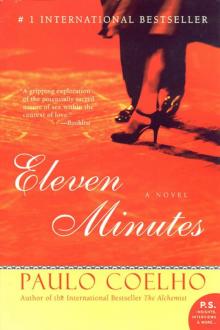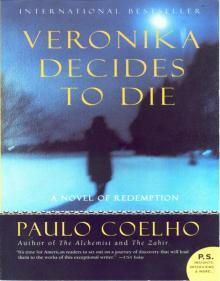- Home
- Paulo Coelho
Veronika Decides to Die: A Novel of Redemption Page 8
Veronika Decides to Die: A Novel of Redemption Read online
Page 8
Veronika did as her mother asked, sure that her mother had enough experience of life to understand reality. She finished her studies, went to university, got a good degree, but ended up working as a librarian.
"I should have been crazier." But, as it undoubtedly happens with most people, she had found this out too late.
She was about to continue on her way when someone took her by the arm. The powerful sedative was still flowing in her veins; that's why she didn't react when Eduard, the schizophrenic, delicately began to lead her in a different direction--toward the living room.
The moon was still new, and Veronika had already sat down at the piano--in response to Eduard's silent request--when she heard a voice coming from the refectory, someone speaking with a foreign accent. Veronika could not remember having heard it in Villete before.
"I don't want to play the piano just now, Eduard. I want to know what's going on in the world, what they're talking about over there, who that man is."
Eduard smiled, perhaps not understanding a word she was saying, but she remembered what Dr. Igor had said: Schizophrenics could move in and out of their separate realities.
"I'm going to die," she went on, hoping that her words were making sense to him. "Today death brushed my face with its wing and will probably be knocking at my door if not tomorrow, then soon afterward. It's not a good idea for you to get used to listening to the piano every night.
"No one should let themselves get used to anything, Eduard. Look at me; I was beginning to enjoy the sun again, the mountains, even life's problems, I was beginning to accept that the meaninglessness of life was no one's fault but mine. I wanted to see the main square in Ljubljana again, to feel hatred and love, despair and tedium--all those simple, foolish things that make up everyday life, but that give pleasure to your existence. If one day I could get out of here, I would allow myself to be crazy. Everyone is indeed crazy, but the craziest are the ones who don't know they're crazy; they just keep repeating what others tell them to.
"But none of that's possible, do you see? In the same way, you can't spend the whole day waiting for night to come. Or for one of the patients to play the piano, because soon that will end. My world and yours are about to come to an end."
She got up, tenderly touched the boy's face, and then went to the refectory.
When she opened the door, she came upon an unusual scene; the tables and chairs had been pushed back against the walls, forming a large central space. There, sitting on the floor, were the members of the Fraternity, listening to a man in a suit and tie.
"...then they invited Nasrudin, the great master of the Sufi tradition, to give a lecture," he was saying.
When the door opened, everyone in the room looked at Veronika. The man in the suit turned to her.
"Sit down."
She sat down on the floor next to Mari, the white-haired woman who had been so aggressive on their first encounter. To Veronika's surprise, Mari gave her a welcoming smile.
The man in the suit went on: "Nasrudin arranged to give a lecture at two o'clock in the afternoon, and it looked set to be a great success: The thousand seats were completely sold out and more than seven hundred people were left outside, watching the lecture on closed-circuit television.
"At two o'clock precisely an assistant of Nasrudin's came in, saying that, for unavoidable reasons, the lecture would begin late. Some got up indignantly, asked for their money back, and left. Even so a lot of people remained both inside and outside the lecture hall.
"By four in the afternoon, the Sufi master had still not appeared, and people gradually began to leave the place, picking up their money at the box office. The working day was coming to an end; it was time to go home. By six o'clock, the original seventeen hundred spectators had dwindled to less than a hundred.
"At that moment Nasrudin came in. He appeared to be extremely drunk and began to flirt with a beautiful young woman sitting in the front row.
"Astonished, the people who had remained began to feel indignant. How could the man behave like that after making them wait four solid hours? There were some disapproving murmurs, but the Sufi master ignored them. He went on, in a loud voice, to say how sexy the young woman was, and invited her to go with him to France."
Some teacher! thought Veronika. Just as well I've never believed in such things.
"After cursing the people who were complaining, Nasrudin tried to get up but fell heavily to the floor. Disgusted, more people decided to leave, saying it was pure charlatanism, that they would denounce the degrading spectacle to the press.
Only nine people remained. As soon as the final group of outraged spectators had left, Nasrudin got up; he was completely sober, his eyes glowed, and he had about him an air of great authority and wisdom. "Those of you who stayed are the ones who will hear me," he said. "You have passed through the two hardest tests on the spiritual road: the patience to wait for the right moment and the courage not to be disappointed with what you encounter. It is you I will teach."
"And Nasrudin shared with them some of the Sufi techniques."
The man paused and took a strange flute out of his pocket.
"Let's take a short break now, and then we'll do our meditation."
The members of the group stood up. Veronika didn't know what to do.
"You get up too," said Mari, grabbing her hand. "We've got a five-minute break."
"I'll leave, I don't want to be in the way."
Mari led her to one corner.
"Haven't you learned anything, not even with the approach of death? Stop thinking all the time that you're in the way, that you're bothering the person next to you. If people don't like it, they can complain. And if they don't have the courage to complain, that's their problem."
"That day, when I came over to you, I was doing something I'd never dared to do before."
"And you allowed yourself to be cowed by a joke made by a lunatic. Why didn't you just stick to your guns? What did you have to lose?"
"My dignity, by being where I wasn't welcome."
"What's dignity? It's wanting everyone to think you're good, well-behaved, full of love for your fellow man. Have some respect for nature, watch a few films about animals, and see how they fight for their own space. We all heartily approved of that slap of yours."
Veronika did not have any more time to spend fighting for space, and so she changed the subject and asked who the man in the suit was.
"You're improving." Mari laughed. "You now ask questions without worrying about whether you're being indiscreet or not. He's a Sufi master."
"What does 'Sufi' mean?"
"Wool."
Veronika didn't understand. Wool?
"Sufism is the spiritual tradition of the dervishes. Its teachers never strive to show how wise they are, and their disciples go into a trance by performing a kind of whirling dance."
"What's the point of that?"
"I'm not quite sure, but our group has resolved to investigate all prohibited experiences. All my life, the government taught us that the only purpose of searching for a spiritual meaning to life was to make people forget about their real problems. Now tell me this: Wouldn't you say that trying to understand life was a real problem?"
Yes, it was, although Veronika wasn't sure any more what the word "real" meant.
The man in the suit--a Sufi master, according to Mari--asked them all to sit in a circle. From a vase he removed all the flowers but one, a single red rose, and this he placed in the center of the group.
"You see how far we've come?" said Veronika to Mari. "Some madman decided it was possible to grow flowers in winter, and nowadays, throughout Europe, we have roses all year round. Do you think even a Sufi master, with all his knowledge, could do that?"
Mari seemed to guess her thoughts.
"Save your criticisms for later."
"I'll try to, although all I have is the present, and a very brief one too, it seems."
"That's all anyone has, and it's always very brie
f, although, of course, some people believe they have a past where they can accumulate things and a future where they will accumulate still more. By the way, speaking of the present moment, do you masturbate a lot?"
Although still under the effects of the sedative she had been given, Veronika was immediately reminded of the first words she had heard in Villete.
"When I was first brought here and was still full of tubes from the artificial respirator, I clearly heard someone asking me if I wanted to be masturbated. What is all that about? Why do you people spend your time thinking about such things?"
"It's the same outside; it's just that here we don't need to hide the fact."
"Was it you who asked me?"
"No, but I think that, as far as pleasure is concerned, you do need to discover how far you can go. Next time, with a little patience, you might be able to take your partner there too, instead of waiting to be guided by him. Even if you have only two days to live, I don't think you should leave this life without knowing how far you can go."
"Only if my partner is the schizophrenic who's right now waiting to hear me play the piano again."
"He's certainly nice looking."
The man in the suit interrupted their conversation with a call for silence. He told everyone to concentrate on the rose and to empty their minds.
"The thoughts will come back, but try to push them to one side. You have two choices: to control your mind or to let your mind control you. You're already familiar with the latter experience, allowing yourself to be swept along by fears, neuroses, insecurity, for we all have self-destructive tendencies.
"Don't confuse insanity with a loss of control. Remember that in the Sufi tradition, the master--Nasrudin--is the one everyone calls the madman. And it is precisely because his fellow citizens consider him insane that Nasrudin can say whatever he thinks and do whatever he wants. So it was with court jesters in the Middle Ages; they could alert the king to dangers that the ministers would not dare to comment on because they were afraid of losing their positions.
"That's how it should be with you; stay insane, but behave like normal people. Run the risk of being different, but learn to do so without attracting attention. Concentrate on this flower and allow the real "I" to reveal itself."
"What is the real "I"?" asked Veronika. Perhaps everyone else there knew, but what did it matter: She must learn to care less about annoying others.
The man seemed surprised by the interruption, but he answered her question.
"It's what you are, not what others make of you."
Veronika decided to do the exercise, concentrating as hard as she could on discovering who she was. During those days in Villete, she had felt things she had never before felt with such intensity--hatred, love, fear, curiosity, a desire to live. Perhaps Mari was right: Did she really know what it meant to have an orgasm? Or had she only gone as far as men had wanted to take her?
The man started playing the flute. Gradually the music calmed her soul, and she managed to concentrate on the rose. It might have been the effect of the sedative, but the fact was that since she had left Dr. Igor's consulting room, she had felt extremely well.
She knew she was going to die soon, why be afraid? It wouldn't help at all, it wouldn't prevent the fatal heart attack; the best plan would be to enjoy the days and hours that remained, doing things she had never done before.
The music was soft, and the dim light in the refectory created an almost religious atmosphere. Religion: Why didn't she try going deep inside herself and see what remained of her beliefs and her faith?
The music, however, was leading her elsewhere: Empty your mind, stop thinking about anything, simply be. Veronika gave herself up to the experience; she stared at the rose, saw who she was, liked what she saw, and felt only regret that she had been so hasty.
When the meditation was over and the Sufi master had left, Mari stayed on for a while in the refectory, talking to the other members of the Fraternity. Veronika said she was tired and left at once; after all, the sedative she had been given that morning had been strong enough to knock out a horse, and yet she had still had strength enough to remain awake all that time.
THAT'S YOUTH for you; it sets its own limits without even asking if the body can take it. Yet the body always does."
Mari wasn't tired; she had slept late, then decided to go for a walk in Ljubljana--Dr. Igor required the members of the Fraternity to leave Villete every day. She had gone to the movies and fallen asleep again in her seat, watching a profoundly boring film about marital conflict. Was there no other subject? Why always repeat the same stories--husband with lover, husband with wife and sick child, husband with wife, lover, and sick child? There were more important things in the world to talk about.
The conversation in the refectory did not last long; the meditation had left the group members feeling relaxed and they were all ready to go back to their wards, except Mari, who instead went out into the garden. On the way she passed the living room and saw that the young woman had not yet managed to get to bed. She was playing for Eduard the schizophrenic, who had perhaps been waiting all that time by the piano. Like children, the insane will not budge until their desires have been satisfied.
The air was icy. Mari came back in, grabbed a coat and went out again. Outside, far from everyone's eyes, she lit a cigarette. She smoked slowly and guiltlessly, thinking about the young woman, the piano music she could hear, and life outside the walls of Villete, which was becoming unbearably difficult for everyone.
In Mari's view this difficulty was due not to chaos or disorganization or anarchy, but to an excess of order. Society had more and more rules, and laws that contradicted the rules, and new rules that contradicted the laws. People felt too frightened to take even a step outside the invisible regulations that guided everyone's lives.
Mari knew what she was talking about; until her illness had brought her to Villete, she had spent forty years of her life working as a lawyer. She had lost her innocent vision of justice early in her career, and had come to understand that the laws had not been created to resolve problems but in order to prolong quarrels indefinitely.
It was a shame that Allah, Jehovah, God--it didn't matter what name you gave him--did not live in the world today, because if he did, we would still be in paradise, while he would be mired in appeals, requests, demands, injunctions, preliminary verdicts, and would have to justify to innumerable tribunals his decision to expel Adam and Eve from paradise for breaking an arbitrary rule with no foundation in law: Of the tree of the knowledge of good and evil thou shalt not eat.
If he had not wanted that to happen, why did he put the tree in the middle of the garden and not outside the walls of paradise? If she were called upon to defend the couple, Mari would undoubtedly accuse God of administrative negligence, because, in addition to planting the tree in the wrong place, he had failed to surround it with warnings and barriers, had failed to adopt even minimal security arrangements, and had thus exposed everyone to danger.
Mari could also accuse him of inducement to criminal activity, for he had pointed out to Adam and Eve the exact place where the tree was to be found. If he had said nothing, generation upon generation would have passed on this earth without anyone taking the slightest interest in the forbidden fruit, since the tree was presumably in a forest full of similar trees, and therefore of no particular value.
But God had proceeded quite differently. He had devised a rule and then found a way of persuading someone to break it, merely in order to invent punishment. He knew that Adam and Eve would become bored with perfection and would, sooner or later, test his patience. He set a trap, perhaps because he, Almighty God, was also bored with everything going so smoothly: If Eve had not eaten the apple, nothing of any interest would have happened in the last few billion years.
When the law was broken, God--the omnipotent judge--even pretended to pursue them, as if he did not already know every possible hiding place. With the angels looking on, amused by the g
ame (life must have been very dreary for them since Lucifer left heaven), he began to walk about the garden. Mari thought what a wonderful scene in a suspense movie that episode from the Bible would make: God's footsteps, the couple exchanging frightened glances, the feet suddenly stopping in their hiding place.
"Where art thou?" asked God.
"I heard thy voice in the garden, and I was afraid, because I was naked; and I hid myself," Adam replied, without knowing that by making this statement, he had confessed himself guilty of a crime.
So, by means of a simple trick, pretending not to know where Adam was or why he had run away, God got what he wanted. Even so, in order to leave no doubts among the audience of angels who were intently watching the episode, he decided to go further.
"Who told thee that thou was naked?" said God, knowing that this question could have only one possible response: "Because I ate of the tree of the knowledge of good and evil."
With that question, God demonstrated to his angels that he was a just God, and that his condemnation of the couple was based on solid evidence. From then on, it wasn't a matter of whether it was the woman's fault or of their asking for forgiveness: God needed an example, so that no other being, earthly or heavenly, would ever again dare to go against his decisions.
God expelled the couple, and their children paid for the crime too (as still happens with the children of criminals) and thus the judiciary system was invented: the law, the transgression of the law (no matter how illogical or absurd), judgment (in which the more experienced triumphs over the ingenuous), and punishment.
Since all of humanity was condemned with no right of appeal, humankind decided to create a defense mechanism against the eventuality of God deciding to wield his arbitrary power again. However, millennia of study resulted in so many legal measures that, ultimately, we went too far, and justice became a tangle of clauses, jurisprudence, and contradictory texts that no one could quite understand.
So much so that, when God had a change of heart and sent his Son to save the world, what happened? He fell into the hands of the very justice he had invented.

 The Alchemist
The Alchemist Maktub
Maktub Like the Flowing River
Like the Flowing River The Winner Stands Alone
The Winner Stands Alone The Spy
The Spy By the River Piedra I Sat Down and Wept: A Novel of Forgiveness
By the River Piedra I Sat Down and Wept: A Novel of Forgiveness Eleven Minutes
Eleven Minutes Manuscript Found in Accra
Manuscript Found in Accra Warrior of the Light
Warrior of the Light Veronika Decides to Die: A Novel of Redemption
Veronika Decides to Die: A Novel of Redemption The Devil and Miss Prym: A Novel of Temptation
The Devil and Miss Prym: A Novel of Temptation The Valkyries: An Encounter With Angels
The Valkyries: An Encounter With Angels Brida: A Novel
Brida: A Novel Fifth Mountain: A Novel
Fifth Mountain: A Novel Adultery
Adultery Inspirations
Inspirations The Archer
The Archer The Witch of Portobello
The Witch of Portobello The Pilgrimage
The Pilgrimage The Zahir
The Zahir Brida
Brida The Fifth Mountain
The Fifth Mountain Like the Flowing River: Thoughts and Reflections
Like the Flowing River: Thoughts and Reflections Manual of the Warrior of Light
Manual of the Warrior of Light By The River Piedra I Sat Down & Wept
By The River Piedra I Sat Down & Wept The Supreme Gift
The Supreme Gift Aleph
Aleph Hippie
Hippie Witch of Portobello
Witch of Portobello The Devil and Miss Prym
The Devil and Miss Prym The Alchemist - 10th Anniversary Edition
The Alchemist - 10th Anniversary Edition The Valkyries
The Valkyries